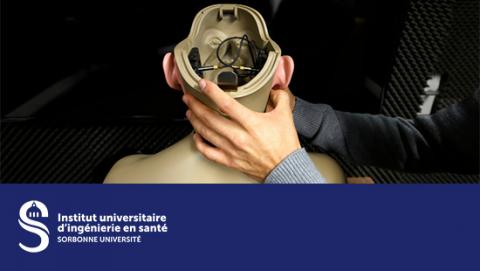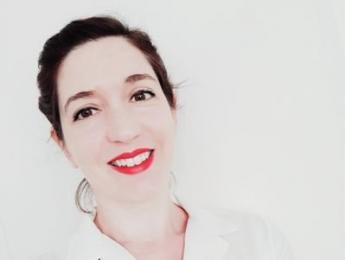
"The university institute of engineering in health is one of the very first institutes of Sorbonne University"
Marie-Aude Vitrani, associate professor at the Institute of Intelligent Systems and Robotics (ISIR) co-directs the University Institute of Health Engineering (IUIS) with the urological surgeon, Prof. Pierre Mozer.

This institute's mission is to encourage educational, scientific and technological innovation for health by offering a structure to host multidisciplinary teams that interact between engineering, health and the human and social sciences.
How was the institute created?
Marie-Aude Vitrani: IUIS is one of the very first institutes at Sorbonne University. It was created in 2014 because engineers were interested in the field of health and doctors were involved in the designs of medical devices, which brought the scientific and medical communities together.
Research on technological devices in health is recent. Engineers and doctors saw the importance of working together on this subject: the former to better understand medical needs, the latter to know what was concretely feasible, and together to make more relevant proposals.
What are the challenges in terms of research and innovation?
MA.V.: Initially, the IUIS launched calls for projects with seed funding to initiate collaborations on many topics. Then, it financed more ambitious and longer-term programs around three main axes (respiratory pathologies, autonomy problems and cancer prediction).
Today, our desire is to broaden our research themes beyond these areas by supporting all project leaders who wish to set up a multidisciplinary collaboration in connection with health engineering. These projects should be a collaboration of both a clinical team and a research team at Sorbonne University.
While the teams at the Faculty of Medicine have been working with the laboratories in the engineering department for a long time, such as ISIR or the LIP6 computer laboratory, we would also like to develop the link with the Faculty of Arts and Humanities. This openness to the humanities and social sciences would make it possible to question medical devices from not only an epistemological but also a sociological point of view: what are the challenges of these technological innovations? What do they change when they are brought into an operating room for the surgeon? For the team? For patients
What are the challenges in terms of academic programs?
MA. V.: There is a real issue in educational programs, particularly with the reform of health studies, which offers medical students the opportunity to follow a minor in another discipline. Conversely, those in science or arts can register for a minor in medicine from the first year.
For the past three years, we have developed training programs focused on entrepreneurship and innovation in health. These courses are designed for students from all three faculties at Sorbonne University. A first module is for a very varied audience. In particular to students of transdisciplinary minors "health innovation" and "medical humanities". We also work in the master's degree in engineering for health and the master's in innovation management. Finally, 4th or 5th year students can also participate in these modules as free auditors. These courses are mainly funded by projects submitted by IUIS in response to European calls organized by the European Institute of Innovation and Technology (EIT) Health.
How does the IUIS actually help its community?
MA.V.: We help researchers to set up and submit their projects and to find public or private funding. We support project leaders in establishing collaborations with colleagues from other disciplines or with the industrial sector.
We also provide them with financial assistance through the establishment of thesis grants, funding for internships, postdoctoral contracts and AP-HP1 reception positions that allow doctors to reduce their clinical activities and give more time to conducting research. Finally, we make the connection with the knowledge and technology transfer services at the faculties for those who want to transfer their technology through licensing or a startup.
In the near future, we will also be setting up interdisciplinary seminars, workshops and conferences to facilitate meetings between the communities of the three faculties.
What impact can research within the institute have on society?
MA.V.: There are more and more technical devices, in hospitals and at home, that support patients and nursing staff, such as surgical robots. It is therefore important that they be designed for and by users, but also in conjunction with industrial partners who can ensure the technology transfer.
This approach, which brings together scientists, doctors, patients and the industrial world, is called translational research. Through our support of this range of expertise and experience at IUIS, we are promoting this way of working.
1 Public assistance - Hospitals of Paris
